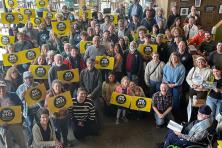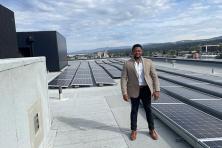Is this life on Mars? The last few days have been filled with images of our shared sky literally burnt orange in color. Like a light switch the other day, it felt like the entire Pacific Northwest was on fire. Things seem so volatile in so many ways at once.
While stuck in the stress of the smoke, COVID, racial injustice, and economic peril, we are also approaching the last two months of this critical and volatile election period. We need to look ahead to be ready to go when things settle from this historic vote.
So first, a bit of bright news during these hard times. The climate movement in the United States is better aligned than it has ever been. Journalist David Roberts recently offered a compelling summary of this alignment, describing the convergence around three big ideas for how to address the climate crisis: standards, investment, and justice. Roberts traces the arc of the climate movement as it shifts away from the emphasis on pursuing policies to account for the cost of carbon pollution, to focusing on implementing policies to move toward 100 percent clean electricity, investing in developing and deploying technologies like renewables and electric vehicles at scale, and ensuring that all of the work has a foundation rooted in a deep commitment to racial justice.
The potential if we can drive change centered on these three big ideas is more promising than ever. Currently, however, the slow pace of change in public policy is the primary barrier to progress. That said, there are two incredibly promising trends underway right now that should give us all reason for hope.
- Truly affordable clean energy: There is a rapid decline in the upfront cost for solutions like solar, wind, batteries, and electric cars and buses, and other scalable clean energy solutions. Battery prices for electric cars have dropped about 85 percent over the past decade. The cost of wind turbines and installing solar has dropped about 70 percent during the same period.
- Private sector leadership: Corporate giants like Microsoft and Amazon have announced bold climate commitments this past year. Only time will tell whether companies make good on their promises, but there is little doubt that many major corporations have moved beyond lip service and greenwashing and are taking serious and significant action.
With the economics of climate solutions improving rapidly and the business world making commitments that will further drive down costs, more people have access to affordable electric cars and renewable energy every day.
If we had more time, perhaps we could simply let the market keep driving down costs, making it economically irresistible to move away from fossil fuels and toward cheaper solutions. Unfortunately the science is terrifying and the smoke and wildfires now remind us: to avoid catastrophic climate change we must accelerate progress, and make sure that the benefits of the clean energy transition reach everybody.
We also have another huge problem - racial justice and inequality. In a recent piece we talked about how important it is to address climate justice and racial justice together, not separately. Climate policy must include all three elements- standards, investment, and justice- in order to address the challenges before us at speed and scale.
With this election, the opportunity for transformative change is upon us. There could be incredible momentum to take bold action on climate. It is critically important that we are ready to act if that happens.
Here’s how we’re thinking about our broad strategy right now:
- Push for large and strategic investments in clean energy solutions at the federal level. If elected, one of Biden’s first acts as president should be to pass a very large infrastructure stimulus package focused on a wide range of equitable solutions—from electric car and bus infrastructure, to grid modernization and increased public transit. Smart capital investments could turbo-charge the clean energy economy and speed up the cycle of innovation.
- Accelerate the drive for ambitious policy standards at the state and local levels. No matter the outcome of the presidential race, we need to continue pressing states to lead. States across the country including Virginia and Colorado have passed major climate bills. Oregon Governor Kate Brown issued one of the most sweeping climate change executive orders in the nation. Washington State passed the strongest 100% clean electricity standard in the country in 2019, one that included cutting-edge labor and equity provisions. States are taking action, and have a lot of room to grow to do even more.
- Build partnerships between national and state players to maximize the impact of federal investments. Ultimately, progress on climate happens in our communities. Making homes more efficient, deploying solar panels on buildings, and installing electric charging stations happens at the state and local level. To accelerate progress, we need strong standards-based state policies supported by meaningful federal financial investments, combined with a focus on climate justice. This will take strong partnerships between federal, Tribal, state governments, and national and state-based groups.
- Stabilize state and local budgets with core assistance. The budgets of every single jurisdiction are facing nearly unprecedented challenges, while essential entities are asked to do more for public health, inequality, housing, and other needs with shrinking resources to do it. The federal government needs to act immediately and provide support for state and local government so that they can do their vital work. With that core support, even states with leaders who generally want to act on climate will likely find it easier to pass and implement climate policies while grappling with crippling budget deficits.
We are at an inflection point where we need to do a large number of things all at once. If we move forward with these four strategies post-election we could shift things significantly and make major climate progress.
Your help in turning these strategies into action will be essential. Right now here are some things you can do:
Take the Climate Voter Pledge
We need far more political accountability with our elected officials, and one way we can do that is with our vote. More people participating in democracy makes for a stronger country and builds greater accountability with our elected officials.
- Commit to voting this election. Make sure you're registered at your current address, and return your ballot by November 3rd (or as early as possible!).
- Commit to getting at least three more people to register to vote or update their registration information.
- Tell candidates that your support depends on their commitment to climate and racial justice.
Support the struggle for racial justice
There are so many great organizations doing important anti-racist work on the frontlines here in the Northwest. Here are two of our suggestions:
Washington state: Give to Front and Centered’s Frontline Response Fund
This fund provides support to people dealing with lay-offs, school closures, medical issues, and other impacts of the coronavirus pandemic in communities throughout Washington State.
Oregon: Donate to support the Oregon Worker Relief Fund
Causa, Latino Network, Voz Worker Education Project, and Pineros y Campesinos Unidos del Noroeste (PCUN) have created this fund to support immigrant workers in Oregon, workers who are left out of the Federal Stimulus package. All donations go directly to community members in need who cannot access unemployment insurance benefits.
Save the Date for November 4th
While there is a lot to focus on between now and November 3rd, we need to be ready on November 4th for what comes next and immediately call for strong action post-election. We’ll need to keep the pressure on to ensure that these proposals become the framework for a clean energy economy that creates healthier communities and a more vibrant and just economy. Get ready to get started.
The impacts we see do not have to be the new normal. We can have a clean energy future vs. one that feels like one on a far off planet.
If you have any reactions, please send them my way at gregg.small@climatesolutions.org.




